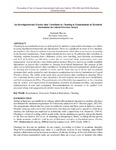An Investigation into Factors that Contribute to Cheating in Examinations in Technical Institutions in Central Province, Kenya
Abstract
Cheating in an examination is an act of deception by students to gain unfair advantage over others
by using unauthorized materials and information. There is a significant increase in test cheating.
Among those who cheat are students in technical institutions, where there is recurrence of cheating
in the internal examinations. Some studies identify factors such as the following that contribute to
cheating: students learning from a dishonest society, poor teaching, poor learning environment
and lack of facilities, an education system that is concerned about performance, poor time
management, lack of effective study habits and technology. However, there is no readily available
information on factors that contribute to cheating in technical institutions. The purpose of this
study was to investigate factors that contribute to cheating in internal examinations, methods used
in cheating and reasons for students to cheat; and the main aim was to devise and recommend
strategies that can be applied to curb cheating in examinations in technical institutions in Central
Province, Kenya. The results of the study show several factors that contribute to cheating. These
are: contextual factors such as class attendance, lecturer-student interactions, poor invigilation,
and lack of adequate facilities. The participants raised the following suggestions on how cheating
may be curbed: strict supervision of examination, provision of adequate facilities, and frequent
administration of tests and assignment. Recommendations on measures to be applied were
presented along with suggestions for further research in this area.

